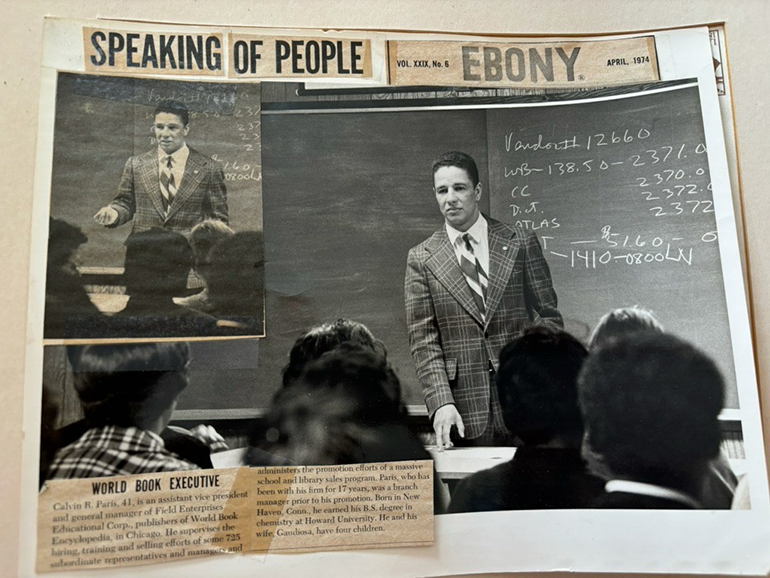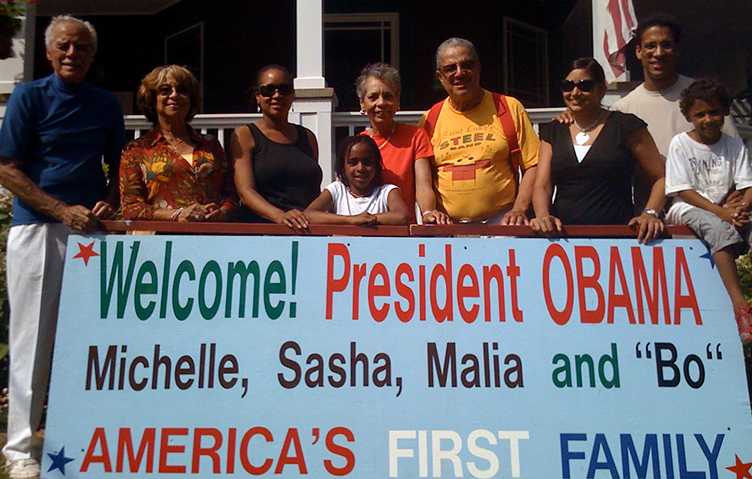We all have a legacy of a history that is different. Life histories make us look at the world a little bit differently. We are a product of our past, and appreciating what has happened in our past is a part of ensuring that our present day works better. - Ted Paris, EVP, TD Bank AMCB, Head of U.S. Data and Analytics.
Ted's own family includes members that have been nationally recognized for their work in the Civil Rights era and others who are not as well-known, but all had the boldness to make better lives for their families and communities.
It's this boldness and courage shared in Ted's family and by millions of other Black families that he will honor this Juneteenth, a federal holiday on June 19 commemorating the reading of the Emancipation Proclamation in Texas on June 19, 1865, that freed all Blacks from enslavement in the United States.
Ted's relatives include his cousin, affectionately called Aunt Connie within the family. She was known to the outside world as Constance Baker Motley. She was the first Black woman to argue a case before the Supreme Court, and the first to serve as a federal judge.
When Ted was a child, he said his parents made the bold decision as the first Black family to move into the Beverly neighborhood in Chicago's South Side - during the early 1970s when racial tensions were incredibly high. It took great courage, yet his parents shared the sentiment of the title of President Barack Obama's autobiography, The Audacity of Hope, in believing this move would provide better opportunities.
"There were people who welcomed us, and those who did not," Ted said. "While I witnessed the challenges and struggles that I don't think should have had to exist having grown up in the communities that I did, it helped me reconcile that this isn't a permanent condition. We can all come together."
A cherished stamp that will never be used to send a letter
Ted knew Judge Motley primarily as a child visiting her home in New York. At that time, he just thought of her as another beloved relative and had little knowledge of her groundbreaking historical legacy. Judge Motley lived from 1921 to 2005.
Judge Motley was a pivotal figure in the Civil Rights Movement and the NAACP Legal Defense and Educational Fund (now called the Legal Defense Fund, or LDF). She was one of the co-authors with Thurgood Marshall, the first Black justice on the Supreme Court, for the briefs in Brown v. Board of Education.
She was lead attorney for the cases that desegregated the University of Georgia and the University of Mississippi. Judge Motley was the first Black woman to argue a case before the U.S. Supreme Court, according to the Columbia University Law School, where she was the second Black woman to graduate. She was also the first Black woman to be elected a New York state senator, Manhattan borough president and to serve as a federal judge.
"It was with time I began to appreciate her achievements," Ted said. "As I look back at our society today, I appreciate it more and more."
Earlier this year, Judge Motley was honored by the U.S. Postal Service with a stamp, becoming the 47th in the Black Heritage series, joining Martin Luther King Jr. and other giants from the Civil Rights Movement. Ted first saw the stamp in public when he went to the post office to mail his taxes.
"I walked in and it's up there in several spaces," Ted said. "I bought several sheets of stamps with her on it just to have them. I will never use them to mail anything. It's really incredible."
The inspiration from his parents

Ted didn't have to leave home to find courage and boldness. His mother, Gaudiosa Erazo Paris, came from Puerto Rico to study medicine at the University of Buffalo and became a physician at a time when women were the exception in the medical field, and minority women were even more rare.
Ted's father, Calvin Paris, a native of New Haven, Connecticut, graduated from Howard University and attended Meharry Medical College to study dentistry. However, he was unable to afford tuition, so he focused on his job selling World Book Encyclopedias. His success at World Book eventually led to more career opportunities, coverage by Ebony magazine and the move to Chicago.
After retiring from World Book, he became the owner of Baskin-Robbins and Nutrisystem franchises in several mid-western states. Ted noted that he accompanied his father at times when he was looking at retail locations, which showed him a painful reality.
"On the phone it was one thing, they would be very welcoming, yet the minute they saw us, no space was available," Ted said. "My father would sometimes have to mask the fact that he was the owner to vendors, customers and employees because people did not want to be serviced by a Black-owned business."
Hopes for the present and future

Juneteenth was not typically celebrated in Chicago, where Ted grew up. But his parents did have a priority on making sure their children had pride in their Black heritage with visits to the Museum of African American History and events sponsored by his father's HBCU.
Ted notes his middle name is Thurgood, honoring Thurgood Marshall and creating a strong connection to Black history.
"My father grew up in a Black neighborhood," Ted said. "He stepped out of that and took us somewhere else because he felt it was better for us to become part of a larger community. But my parents emphasized that we should recognize where we came from and take pride in it."
Ted's parents' dedication to providing every opportunity in life paid off in so many ways. He is a husband and father of three children who are now young adults. Ted's children have a mixed heritage and consider themselves members of multiple racial and ethnic groups, including Black, Puerto Rican, West Indian, Jewish, French and Moroccan.
"My parents certainly had a role in how my children perceive themselves," Ted said." But they will go on and figure out the best life for themselves. "
Some of the most memorable times that Ted has spent with his family have been on Martha's Vineyard, in Massachusetts where Ted has been traveling to since his youth and where he currently has a family home. A major reason Ted wanted to have a family home there was the connection to the Black community. Oak Bluffs, on Martha's Vineyard was famously one of the first places that well-to-do Black families could vacation and be accepted. One of his favorite memories is when the Obamas first visited the island, and Ted's family put up a sign outside their home to welcome them.
In his professional life, Ted is a graduate of Georgetown University and received a master's degree from the Harvard Kennedy School. He had an esteemed career in the banking industry before coming to TD in 2016, where he started in Toronto. His current role puts at the forefront of data & analytics, a vital area for the bank.
He takes a lot of pride in working for TD.
"It is an institution that embraces diversity that I could see from the outside and it resonated with me," Ted said. "When I joined TD, I saw how they celebrate, recognize, and appreciate diversity. It is a point of pride. I wear the (TD) pin in public. TD is for me, a special place."
